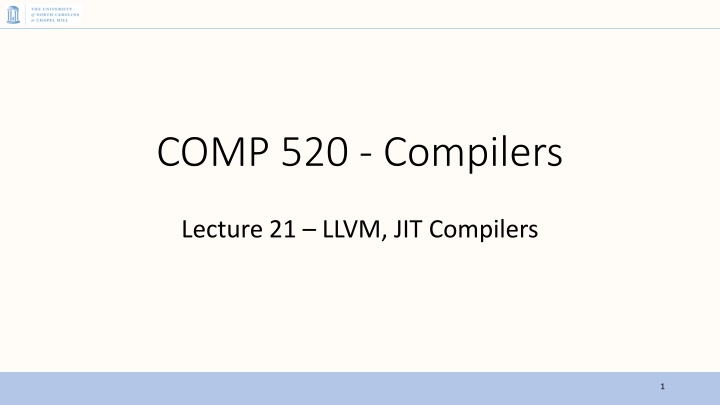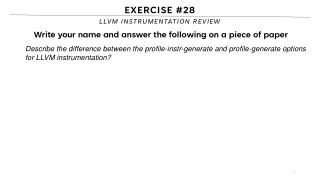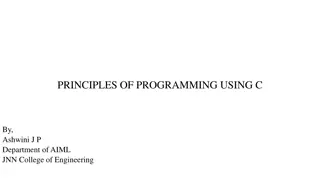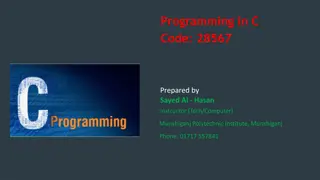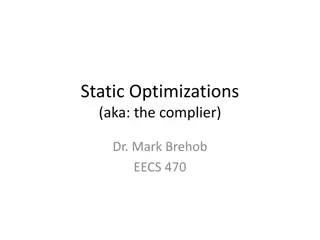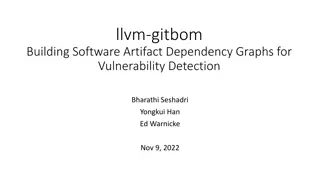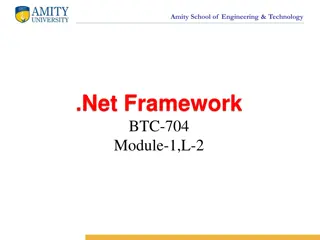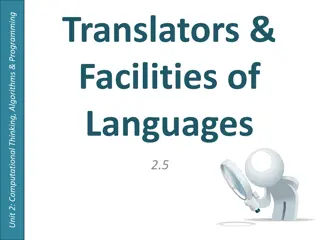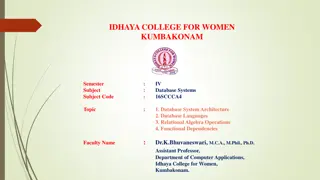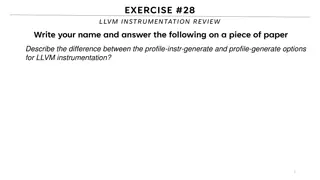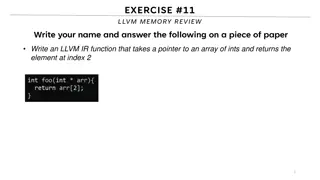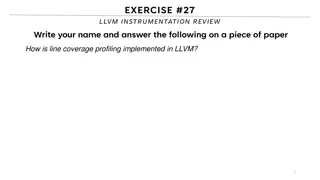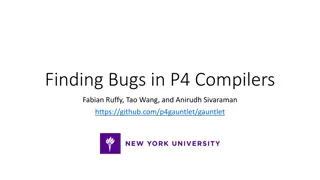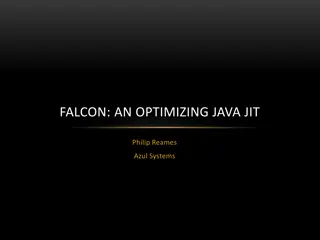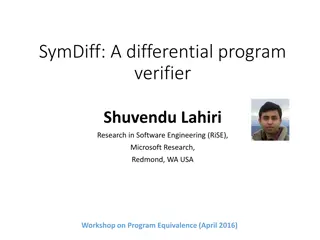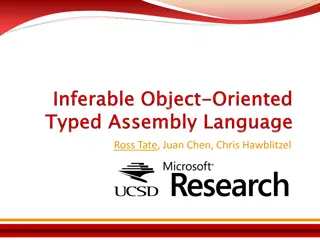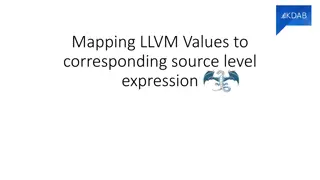Overview of COMP.520: Compilers with S. Ali
An overview of COMP.520: Compilers with S. Ali covering topics such as LLVM, JIT compilers, interesting ID errors, virtual address table vs VAT pointer, PA4 overview, local declarations, field declarations, method declarations, and variable access. The course includes important announcements and recommendations for COMP-750. Dive into the world of compilers and explore various concepts related to compiler design and implementation.
Download Presentation

Please find below an Image/Link to download the presentation.
The content on the website is provided AS IS for your information and personal use only. It may not be sold, licensed, or shared on other websites without obtaining consent from the author.If you encounter any issues during the download, it is possible that the publisher has removed the file from their server.
You are allowed to download the files provided on this website for personal or commercial use, subject to the condition that they are used lawfully. All files are the property of their respective owners.
The content on the website is provided AS IS for your information and personal use only. It may not be sold, licensed, or shared on other websites without obtaining consent from the author.
E N D
Presentation Transcript
COMP 520 - Compilers Lecture 21 LLVM, JIT Compilers 1
Announcements Please do course evaluations! Final Exam is 5/9 at 4:00pm The exam is written to be taken in 90 minutes, but I m going to give you the full 180 minutes should you desire it. 2 COMP 520: Compilers S. Ali
COMP-750 I recommend this class, but keep in mind, COMP-750 assumes you are taking at most one other class. Very difficult class even if you are only taking one other. 3 COMP 520: Compilers S. Ali
Interesting ID Errors Can access only the top-most class s variables when multiple inherited fields use the same variable. Assume A, B, C all contain public: int x; 4 COMP 520: Compilers S. Ali
Virtual Address Table vs VAT Pointer Either works, but the primary difference is two memory deference operations vs one This memory dereference is already very slow. Turns out the reason is because the method address is a location in the code section, but the VAT will be in the heap, so you go to the heap to eventually load code in two possibly very different locations. With a VAT pointer, you might have two different cache lines for the VAT pointer and the VAT itself. Can cause cache interference galore! 5 COMP 520: Compilers S. Ali
PA4 Overview 6 COMP 520: Compilers S. Ali
LocalDecl- ParameterDecl & VarDecl ParameterDecl VarDecl x [return addr] Old RBP Local var1 Local var2 RBP+16 RSP+32 RBP+8 RSP+24 RBP RSP+16 RBP-8 RSP+8 RBP-16 RSP 7 COMP 520: Compilers S. Ali
FieldDecl- non-static Some Variable s value is a heap address var1 var2 var3 var4 Object Base +8 +16 +24 +32 8 COMP 520: Compilers S. Ali
MethodDecl push rbp mov rbp,rsp Start off with a stack frame End with removing the stack frame If it is the main method, then Consider static vars on the stack End with a sys_exit mov rsp,rbp pop rbp 9 COMP 520: Compilers S. Ali
Variable Access If the variable has a LocalDecl (parameter or VarDecl) Access the variable from [rbp+VD.offset] If the variable has a FieldDecl: If it is static, then access however you access static variables Otherwise, the FieldDecl has an object offset, and access it from some context point (base address in the heap) 10 COMP 520: Compilers S. Ali
QRef If it is static, access static variable, otherwise Visit the LHS to get the heap address, and once again, the RHS is a FieldDecl and has an objOffset, so we can access the variable as normal 11 COMP 520: Compilers S. Ali
Just-in-time Compilers 12 COMP 520: Compilers S. Ali
JIT Compilation Idea: Partially compile parts of a program Compile more of the program as needed A mix of runtime states: Can be running the program normally Program may return to a higher-level runtime where it returns control to the JIT compiler 13 COMP 520: Compilers S. Ali
Step 1: Compile a part of the code Code Part Code Part Accept: Output: IL x64 IL x64 Language x64 User (x64) 14 COMP 520: Compilers S. Ali
Step 2: On-demand (JIT) compile new code New Code New Code Accomplished via a Merge Process Existing Binary New Code Existing Binary New Binary Accept: Output: IL x64 IL x64 Compiler Language User (x64) x64 x64 x64 x64 User (x64) User (x64) Change state (transfer control to JIT compiler, then merge, then resume with new binary) 15 COMP 520: Compilers S. Ali
Problem Statements 1. How much initial/subsequent code to JIT compile? 2. How/When do I invoke the on-demand JIT compiler? 3. How do I merge the two binaries together? 4. What does the entire process look like? (Note, the final binary contains the JIT compiler in it) 16 COMP 520: Compilers S. Ali
First, lets compile the JIT compiler Need to Compile the Compiler GOAL Accept: Accept: Output: Code Output: Code IL x64 IL x64 Accept: Output: Accept: Output: Language Language IL x64 x64 IL C++ x64 C++ x64 Machine (User) Language JIT Compiler Source (Write this) Full details on this will be discussed. What we want (Binary Blob) We will think of this like a library or shared object Language x64 Machine (User) GCC/G++ 17 COMP 520: Compilers S. Ali
How much initial code to compile? On runtime, we have our input file in IL How much do we compile to start the program? Init Code Full Code Init Code Init Code IL IL Accept: Output: IL x64 IL x64 User (x64) Language x64 User (x64) 18 COMP 520: Compilers S. Ali
Initial Code One method at a time Entrypoint in the IL makes sense. Consider: void main(char* argv[], int argn) { bool debugMode = argn > 1; LoadData(debugMode); MainProgram::Instance()->Run(); Cleanup(); } 19 COMP 520: Compilers S. Ali
Method Compilation cmp [rbp+24],1 setg byte ptr[rbp-8] bool debugMode = argn > 1; 20 COMP 520: Compilers S. Ali
Method Compilation (2) cmp [rbp+24],1 setg byte ptr[rbp-8] call ??? call ??? bool debugMode = argn > 1; LoadData(debugMode); 21 COMP 520: Compilers S. Ali
Unknown JIT Entity When compiling this instruction, we don t actually have LoadData compiled in native x64 code. (Infact, we re compiling our main function, nothing else is compiled yet!) cmp [rbp+16],1 setg byte ptr[rbp-8] call call LoadData LoadData??? ??? 22 COMP 520: Compilers S. Ali
Unknown JIT Entity (2) Generate a call to a method in the JIT compiler. Additionally, the LoadData parameter is associated with: cmp [rbp+16],1 setg byte ptr[rbp-8] call JIT( call JIT(LoadData Load Data LoadData) ) IL In the JIT compiler: pushad pushad if( if( LoadData LoadData already compiled ) { already compiled ) { popad popad, call , call LoadData LoadData } else ??? } else ??? 23 COMP 520: Compilers S. Ali
Unknown JIT Entity (3) cmp [rbp+16],1 setg byte ptr[rbp-8] call JIT( call JIT(LoadData Load DataFn Load DataFn LoadData) ) Output: Accept: IL x64 IL x64 Language C++ 24 COMP 520: Compilers S. Ali
If Compiled Load DataFn Load DataFn cmp [rbp+16],1 setg byte ptr[rbp-8] call JIT( call JIT(LoadData Output: Accept: IL x64 IL x64 If Not Compiled LoadData) ) Language C++ Return 25 COMP 520: Compilers S. Ali
Gritty Details How would you minimally define a program s state? 26 COMP 520: Compilers S. Ali
Gritty Details (2) How would you minimally define a program s state? Let s assume very simple hardware: The register file Including the instruction pointer (RIP) The program s memory space (stack and heap) Misc items (handles, pipes, file descriptors, control page, etc.) 27 COMP 520: Compilers S. Ali
Gritty Details (3) The register file: how to go from code to compiler? If we use any registers, the program code might mess up. Consider calling your JIT method when a variable is live in a register, might accidentally write over the live variable. To solve this problem: use the instruction pushad (pushes all registers on the stack) Before calling the method, use popad to restore the register state 28 COMP 520: Compilers S. Ali
Gritty Details (4) Memory space (stack, heap) Because we created the JIT compiler, we know how the stack space is used. For example, in our code, we have a local variable in [rbp-8] but we never moved rsp forward. Determine the maximum amount of unclaimed stack space that contains live data, and move rsp so that it always points to ACTUALLY unused stack space. E.g., sub rsp, 0x100, then after the popad, add rsp,0x100 29 COMP 520: Compilers S. Ali
Gritty Details (5) Misc Items (file descriptors, etc.) Just don t touch these in the JIT compiler, and they will remain in the same state. 30 COMP 520: Compilers S. Ali
Lets continue cmp [rbp+24],1 setg byte ptr[rbp-8] invoke JIT(LoadFn) bool debugMode = argn > 1; LoadData(debugMode); Let s use a shorthand for sub rsp,0x100, pushad, call, popad, add rsp,0x100 and call it invoke. Invoke will also push parameters on the stack. So far so good 31 COMP 520: Compilers S. Ali
Problem: Virtual Method Call cmp [rbp+24],1 setg byte ptr[rbp-8] invoke JIT(LoadFn) invoke JIT(MP::Instance) mov [rbp mov [rbp- -16], 16], rax call [rax+8] call [rax+8] bool debugMode = argn > 1; LoadData(debugMode); mp = MainProgram::Instance(); mp->run(); // virtual method rax Virtual method call is a problem, What do I pass to my JIT method?? 32 COMP 520: Compilers S. Ali
Virtual Methods in JIT Need to be clever and solution will be specific to the hardware. Original code: call [rax+8] Consider: sub rsp,0x100 sub rsp,0x100 pushad pushad push [rax+8] push [rax+8] push push SpecialIdentifier SpecialIdentifier call JIT call JIT JIT( -1, MethodAddr ) Inside the JIT method: if MethodAddr is a known address, then call it, otherwise PROBLEM!! 33 COMP 520: Compilers S. Ali
Virtual Methods in JIT (2) Need to be clever and solution will be specific to the hardware. Original code: call [rax+8] Consider: sub rsp,0x100 sub rsp,0x100 pushad pushad push push rax rax push 8 push 8 push push SpecialIdentifier SpecialIdentifier call JIT call JIT JIT( -1, 8, object ) If the object is sent along with the VAT index, then we know what the method should be, and can find the associated IL code: Method1 in Class A IL 34 COMP 520: Compilers S. Ali
Some details omitted Need to store object type (RTTI) within objects, and that way the JIT compiler will know how to find the method in the IL code. There are some solutions WITHOUT RTTI that involve object allocation occur in the JIT compiler instead of regular runtime, and the VAT entries are all JIT methods. Takeaway: tons of ways to be clever here. 35 COMP 520: Compilers S. Ali
Binary Merging In our example, handled by having the JIT compiler as a loaded library inside our binary. Often, the JIT compiler is inside of the initial binary, and the IL code is too. (Not always, but it s faster) Contains: IL code and JIT compiler Code x64 IL x64 Code x64 IL x64 36 COMP 520: Compilers S. Ali
Final Process You actually need to write a compiler that writes a JIT compiler specific to your input code, and that input code also needs to be converted to IL code that calls the compiled JIT compiler. Okay, that s a lot of words. But why? 37 COMP 520: Compilers S. Ali
Compiler creates IL and JIT Code Code IL Accept: Output: Accept: Output: IL x64 C++ IL+JIT C++ Language Language x64 x64 Machine (Dev) x64 Machine (User) 38 COMP 520: Compilers S. Ali
Compiler creates IL and JIT Contains mappings from method names to parts in the IL code. Code Code When JIT is invoked, find the associated IL code, check if it was already compiled, and if not, compile IL code, and patch the jump through. IL Accept: Output: Accept: Output: IL x64 C++ IL+JIT C++ Language Language x64 x64 Machine (Dev) Thus: need a table based upon the original code. x64 Machine (User) 39 COMP 520: Compilers S. Ali
LLVM Let s look at modern compilers 40 COMP 520: Compilers S. Ali
Kaleidoscope: An LLVM Tutorial https://llvm.org/docs/tutorial/ Let s look at how we can create a modern compiler We can compare and contrast with what we had to do 41 COMP 520: Compilers S. Ali
Step 1: The Lexer/Scanner https://llvm.org/docs/tutorial/MyFirstLanguageFronte nd/LangImpl01.html#the-lexer Idea: accumulate single letters at a time and store them in Tokens After accumulating a string, determine the token type. For example: tok_identifier, tok_number, etc. 42 COMP 520: Compilers S. Ali
Step 1: The Lexer/Scanner https://llvm.org/docs/tutorial/MyFirstLanguageFrontend/LangImpl01.html#the-lexer 43 COMP 520: Compilers S. Ali
Step 1: The Lexer/Scanner - miniJava In comparison, what you learned in this class: Techniques: Make everythinga Token or Reduce the types of Tokens ?-closure and conversion from an NFA to a DFA Can pass on/reduce the burden of context to later stages (e.g. parsing factorial vs negation, or reducing parsing by making fancy decisions like scanning [] as a single Token) 44 COMP 520: Compilers S. Ali
Step 2 Implementing a Parser and AST https://llvm.org/docs/tutorial/MyFirstLanguageFronte nd/LangImpl02.html An AST contains the constructs of the input language. Should closely model the language 45 COMP 520: Compilers S. Ali
Step 2 Implementing a Parser and AST https://llvm.org/docs/tutorial/MyFirstLanguageFrontend/LangImpl02.html 46 COMP 520: Compilers S. Ali
Precedence in LLVM Need to only specify precedence: Assign each Operator token the relevant precedence value. Loop through and find highest precedence operations in an Expression, and resolve those first. 47 COMP 520: Compilers S. Ali
Step 2 Parsing and ASTs in miniJava We learned/discussed Parsing: Recursive descent (implemented) Shift-Reduce parsing (discussed) Push-down automata (you learned this in 455, discussed) We discussed ASTs: Selection of AST grammars should be to achieve a separation of concerns Stratified grammars can create ASTs with proper precedence constraints easily (never worry about precedence again) 48 COMP 520: Compilers S. Ali
LLVM combines PA3 and PA4 https://llvm.org/docs/tutorial/MyFirstLanguageFrontend/LangImpl03.html In their tutorial for LLVM, only one IDTable (called NamedValues), a very simple language that doesn t need SI or objects or fields. In comparison: you learned object oriented contextual analysis, which is significantly harder. CodeGen is actually done per-AST. Each concrete AST defines a codegen method and generates code that way. 49 COMP 520: Compilers S. Ali
LLVM Traversal: You should try visitors https://llvm.org/docs/tutorial/MyFirstLanguageFrontend/LangImpl03.html 50 COMP 520: Compilers S. Ali
